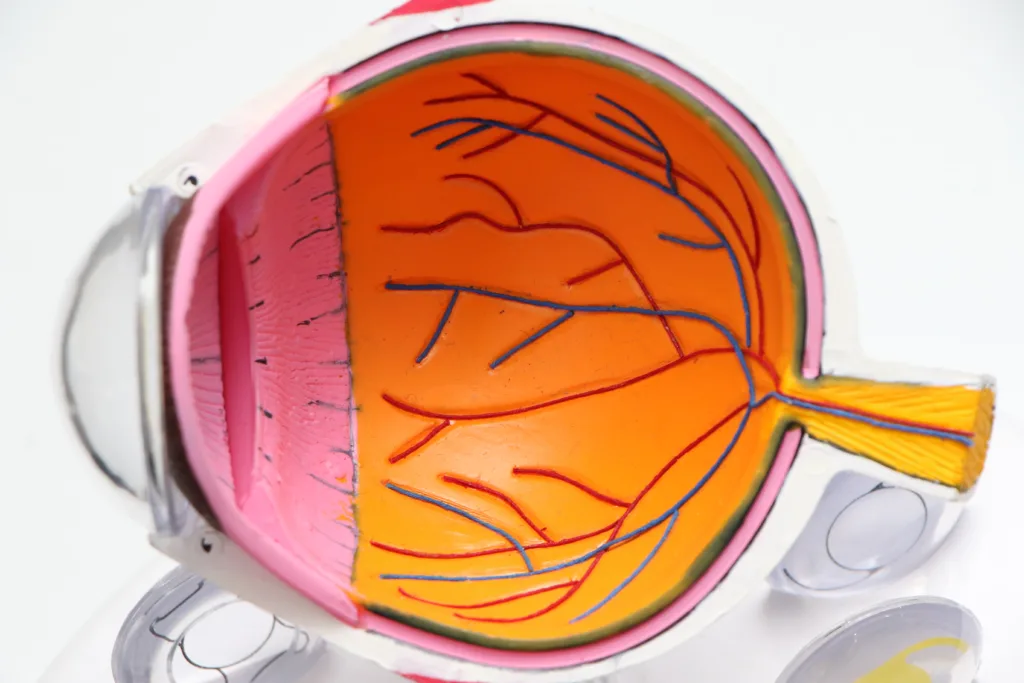Parafoveal Telangiectasia (PFT) is a rare eye condition that affects the capillaries and small blood vessels surrounding the fovea, causing vision loss. This condition can affect one or both eyes, but it is more commonly found in both eyes.
PFT is also known as perifoveal telangiectasis or macular telangiectasia. In this condition, the blood vessels in the center of the retina become abnormal, whch can lead to vision problems. PFT is a progressive disorder that can cause a range of symptoms, including blurred vision, difficulty reading, and distorted vision.
The symptoms of PFT can vary depending on the severity of the condition. In some cases, people may not experience any symptoms at all. However, as the condition progresses, symptoms may become more noticeable and can include blurring of central vision, difficulty reading, and distorted vision.
The cause of PFT is not fully understood, but it is thought to be related to problems with the blood vessels in the eye. Some studies have suggested that PFT may be caused by a genetic mutation or an autoimmune response, while others have suggested that it may be related to aging.
There is currently no known cure for PFT, but there are treatments available to help manage the symptoms. These treatments may include medications to improve blood flow to the retina, laser therapy to treat abnormal blood vessels, and surgery in severe cases.
If you are experiencing vision problems or are concerned about PFT, it is important to speak with an eye specialist as soon as possible. Early diagnosis and treatment can help to slow the progression of the condition and improve your quality of life.
Parafoveal Telangiectasia (PFT) is a rare eye condition that can cause vision loss. Although there is no cure for PFT, there are treatments available to help manage the symptoms. It is important to seek medical attention if you are experiencing any vision problems or concerns.
What Is PFT In Eyes?
Parafoveal telangiectasia, also knon as perifoveal telangiectasia or macular telangiectasia, is a relatively rare eye disease that affects the capillaries and small blood vessels surrounding the fovea, a small central area of the retina responsible for clear, sharp vision. PFT can cause a range of symptoms, including blurred or distorted vision, difficulty with color vision, and central scotomas (blind spots). It can affect one or both eyes, but it most commonly affects both. PFT is often classified into two types: type 1, which tends to occur in younger individuals and is associated with abnormal blood vessels; and type 2, which tends to occur in older individuals and is associated with degeneration of the macula. Treatment options for PFT typically depend on the type and severity of the disease and may include medications, laser therapy, or surgery.

Why Does PFT Always Wear Sunglasses?
PFT, a writer and commentator for Barstool Sports, has stated in an interview with Awful Announcing in 2017 that he wears sunglasses on camera to avoid identification. He further explained that the staff at Barstool Sports referred to him as “PFT”, as only half of them knew his real name. However, despite his efforts to remain anonymous, PFT has acknowledged that his identity had become an “open secret” and that it would eventually be found out. To sum up, PFT wears sunglasses to conceal his identity while on camera to maintain some level of anonymity.
Why Is PFT Called PFT?
PFT stands for Pro Football Talk, which is a website that focuses on news and analysis of the National Football League (NFL). The website was founded in 2008 by Mike Florio, a lawyer and former writer for the Sporting News and ESPN. Florio’s goal was to create a site that provided in-depth coverage of the NFL and its teams, players, and coaches, with an emphasis on breaking news and insider information. Over time, Pro Football Talk has beome one of the most popular and influential NFL news sources on the internet, attracting millions of readers each month. The site covers everything from the latest trade rumors and injury updates to game previews and recaps, and it features a team of writers and contributors who offer their own unique perspectives on the league. The nickname “PFT” has become synonymous with the site and is often used by fans and media members alike when referring to Pro Football Talk.
What Is Idiopathic Parafoveal Telangiectasia?
Idiopathic parafoveal telangiectasia, also known as perifoveal telangiectasis or mac-tel for macular telangiectasia, is a medical condition that affects the blood vessels located at the center of the retina. The condition is characterized by the development of abnormalities in thee blood vessels, which can cause vision problems and other complications. It is called “idiopathic” because the exact cause of the condition is not fully understood.
The symptoms of idiopathic parafoveal telangiectasia can vary depending on the severity of the condition, but often include blurred or distorted vision, difficulty reading, and problems with color perception. In some cases, patients may also experience a loss of visual acuity or blind spots in their field of vision.
Treatment options for idiopathic parafoveal telangiectasia are limited, and may include the use of medications to manage symptoms or surgery to repair damaged blood vessels. However, the effectiveness of these treatments may vary depending on the individual case and the severity of the condition.
Idiopathic parafoveal telangiectasia is a serious medical condition that can significantly impact a person’s vision and quality of life. It is important for patients to seek medical attention if they experience any symptoms of the condition, in order to receive an accurate diagnosis and appropriate treatment.

Conclusion
Parafoveal telangiectasia (PFT) is a rare condition that affects the small blood vessels surrounding the fovea in the eyes. It can result in vision loss and can affect one or both eyes, but is more commonly seen in both eyes. PFT is also known as macular telangiectasia or perifoveal telangiectasis. The condition is characterized by abnormal blood vessels in the center of the retina. While PFT is not a well-known eye disorder, it is important to be aware of its symptoms and seek medical attention if vision problems arise. Early detection and treatment can help manage the condition and preserve vision in affected individuals.
